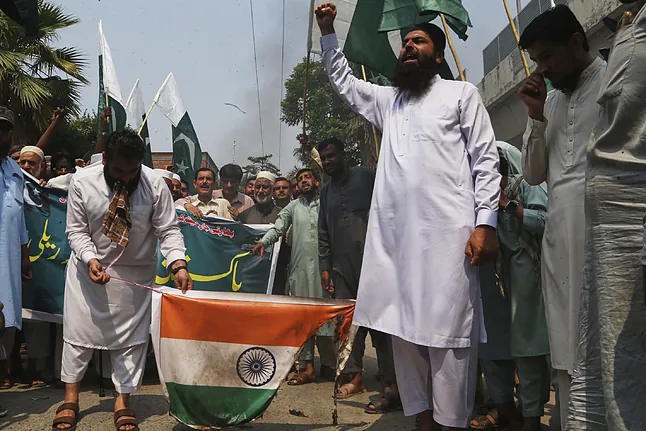When all alarms went off due to the announced Indian army attack as retaliation for a bombing in Kashmir that New Delhi attributed to a terrorist group backed by Pakistan, residents living on both sides of one of the most militarized borders in the world began preparing for war. Once again. This happened at the end of last week. Schools closed, and many families in the divided region of Kashmir took refuge in makeshift underground bunkers and stocked up on all the basic supplies they could.
The first explosions were heard in Pakistani Kashmir around 1:00 a.m. on Wednesday. The Sindoor Operation had begun, the military codename India used to describe what they called a "precision attack" against terrorist infrastructure. Pakistanis claimed that at least 26 civilians were killed and dozens injured by an Indian offensive that targeted Pakistan with missiles in various parts of Punjab, the second most populous province. The projectiles also hit divided Kashmir. "A missile fell near my niece Ruby Kaur's house. She was hit in the head by shrapnel. We urgently took her to a nearby hospital, but she didn't make it," recounted Buava Singh, a resident of the border district of Poonch on the Indian side.
From Delhi, army and government spokespeople of Prime Minister Narendra Modi insisted that the attacks were restrained and targeted "missile storage centers, recruitment centers, and terrorist indoctrination centers." In contrast, Pakistani authorities denounced that the bombings targeted several mosques and villages where many families lived.
Immediately after the barrage of missiles launched from India, troops on both sides engaged in a shootout at various points along the Line of Control, the border established after the first clash between India and Pakistan following their independence from Great Britain in 1947. Several residents of villages on the Indian side were hit by mortar fire. According to Indian authorities, at least ten civilians were killed by Pakistani soldiers' gunfire and bombings.
20 miles from the border, in Muzaffarabad, the mountainous capital of Pakistani-controlled Kashmir, the city went dark after the early morning impact of the first bombs, one of them hitting a mosque. "It was a street mosque where we prayed five times a day. We never saw any suspicious terrorist activity," explained one of the neighbors, Mohammed Waheed, to local BBC journalists. Younis Shah, another resident of Pakistani Kashmir, stated that four missiles fired by the Indian army hit a complex with a school, a student residence, and a medical center.
In Muzaffarabad, residents had been preparing for airstrikes for days and had built simple underground shelters with mud walls. Only a few families, the wealthiest in this poor region, were able to reinforce their hideouts with concrete. Municipal authorities had ordered schools and madrasas to close days ago. They also recommended that the population stock up on provisions to last at least a couple of months. Additionally, emergency service workers had been training many students in rescue and first aid tasks.
In Indian Kashmir, where the brutal Islamic attack with 26 dead tourists that triggered this new military escalation between the two nuclear powers took place, several armed insurgent groups have been resisting Delhi's control with excessive violence for decades. The bloody April attack on Hindu tourists was claimed by an Islamic group that was previously unknown, the self-proclaimed Resistance Front. In contrast, Indian authorities say that the Lashkar-e-Taiba, designated as a "terrorist organization" by the United States and involved in another attack in Mumbai in 2008 with 147 dead, is behind it.
Armed groups in Kashmir typically have strong support from a large part of the local population, which supports the goal of unifying the entire territory, either under Pakistani rule or as an independent country. Modi's government has always directly accused Pakistan of supporting the rebels. Both neighbors have gone to war over Kashmir twice before, most recently in 1999.
The wave of violence intensified, especially in 2019, when Modi, amid a security offensive, revoked the region's special status, which had granted limited autonomy since 1949, allowing Kashmir to maintain its own constitution and the freedom to pass its own laws. New rules were implemented that granted foreigners the right to buy land in Kashmir for the first time, which many residents saw as an attempt by Modi's Hindu nationalist party to strip them of their land and change the region's Muslim demographics.
In Indian Kashmir, and in other regions of the world's most populous country, authorities conducted several security drills on Wednesday in response to threats of a retaliatory attack by the Pakistani army. Emergency sirens sounded, and several mass evacuation exercises were carried out.
